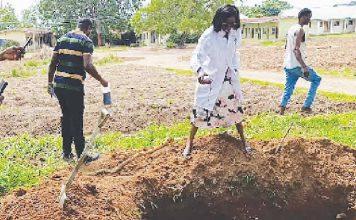The Kwara State Government has confirmed that it has interred all meat taken from the 33 cows that were believed to have been poisoned.
This meat was reportedly being offered for sale at Mandate Market in Ilorin, the capital city of the state. Upon being alerted to this situation by the ‘Kwara Monitoring Group,’ the government acted promptly by shutting down and disinfecting the market, while also urging the public to remain calm.
Investigations conducted by WAKADAILY revealed that the tainted beef from the cows was disposed of near the Kwara State College of Arabic and Islamic Legal Studies in Ilorin. These actions were taken as part of a series of initiatives by the government to safeguard consumers and vendors against consuming hazardous meat from animals that were known to be contaminated.
In an unofficial announcement issued on Sunday, April 21, 2024, the group called upon the Commissioners for Environment and Health, as well as the Kwara Environmental Protection Agency, to swiftly intervene and prevent the toxic meat from being distributed to unsuspecting individuals.
“Over 33 cows were suspected to be poisoned and died immediately but surprisingly, the dead animals were slaughtered and distributed out to butchers to be sold.
“It happened along Atere Road (that leads to Al Hikma campus) right inside the College of Arabic and Islamic Studies, Ilorin.
“It is our prayer that the concerned ministry and agency take appropriate action as nobody knows whose family the poisoned meat could be sold out to in the market,” the group said.
In response to the situation, the State Government issued a statement titled ‘Kwara govt team arrives Mandate market, confiscates suspected beef’, jointly signed by the Commissioners for Health and Agriculture, Dr. Amina El-Imam and Toyosi Thomas Adebayo. The statement disclosed that a government team visited the market to confiscate the allegedly poisoned meat.
Furthermore, the Permanent Secretary of the Ministry of Agriculture and Rural Development, Mrs. Funke Sokoya, provided an update stating that the State Government, in collaboration with the Ministries of Agriculture, Health, Environment, and the State Environmental Protection Agency, along with key stakeholders including the Iyaloja of Mandate Market, collectively agreed to halt slaughtering activities for three consecutive days starting from Monday. This pause would facilitate a thorough fumigation of the slaughter slabs to eliminate any remaining risks.
Earlier, the Kwara Monitoring Group had raised concerns in a statement released on Sunday, April 21, 2024, signed by Dan Musa, urging the relevant authorities to take urgent action to prevent the sale of poisoned meat from the tainted cows to unsuspecting consumers in various marketplaces.
According to the group, “Over 33 cows were suspected to be poisoned and died immediately but surprisingly, the dead animals were slaughtered and distributed out to butchers to be sold.
“It happened along Atere Road (that leads to the Al Hikma campus) right Inside the College of Arabic and Islamic Studies, Ilorin.
“It is our prayers that the concerned Ministry and Agency take the appropriate and immediate action as nobody knows whose family such poisoned meat would be sold to in the market.”
According to a statement issued by the government at the State House titled “Kwara Govt Team arrives Mandate Market, Confiscates Suspected Beef,” jointly signed by the state Commissioners of Health and Agriculture, Dr. Amina El-Imam and Toyosi Thomas Adebayo, the government team visited Mandate Market to confiscate suspected toxic beef.
The statement read in parts, “The Kwara State Government officials and experts have arrived at the Mandate Market in Ilorin to activate measures to protect the public amid rumours of poisoned cow meat.’’
“On the team were the Commissioner for Agriculture and Rural Development Toyosi Thomas-Adebayo; Commissioner for Health Dr Amina Ahmed El-Imam; officials from the Ministry of Environment, including the Executive Secretary of the Kwara State Environmental Protection Agency, Mrs Folorunsho Idayat, and officials from the Ministry of Health, including the Permanent Secretary, Alhaja Afusat Ibrahim, and the Director of Public Health, Dr. Oluwatosin Fakayode, among others.
“The government has immediately confiscated all the suspected meats after laboratory tests and confirmation of claims after initial engagements with the Mandate Market stakeholders in Ilorin the state capital on Sunday morning.”
A preliminary inquiry into the incident revealed that the reason for the unfortunate event was due to the livestock grazing on polluted grass in the vicinity.
The Ministry of Agriculture has pledged to enhance monitoring efforts at the various slaughterhouses in the state, with a particular focus on both private and public facilities. The Director of Veterinary Services highlighted the importance of proactive measures to prevent similar incidents in the future.
Dr Olugbon Abdullateef Saliman stated, “all the private slaughter slabs in the state in the ongoing, will have to reduce their number to the level that the ministry could manage. Any slaughter slab that the meat is not inspected will not be allowed to go out to the market. If the slaughter slab is not following our standard it will be closed down, and those closed down will be directed to the government slaughter slabs.
“Also, any private slaughter slab that is close to the government slab will be directed to go and slaughter at the government slaughter slabs. By this standard, we will be able to monitor what they slaughter and sell to the populace.”
The state government took action on Sunday to temporarily close the abattoir at Mandate Market in Ilorin West Local Government Area until Wednesday due to reports of toxic cow meat being sold there.
The government, through the Permanent Secretary of the Ministry of Environment, Dr. Abubakar Ayinla, also directed the immediate sanitation and fumigation of the premises where the abattoir is located to rid it of any potential contamination from the poisonous meat.
This precautionary measure was deemed necessary in order to safeguard the health of the public in light of the reported sale of harmful meat.
